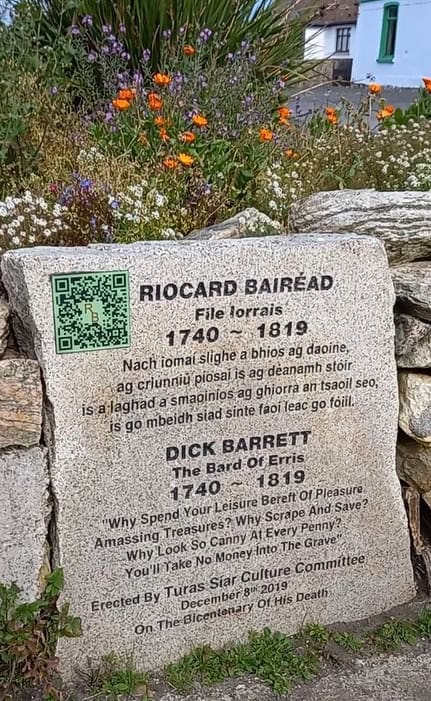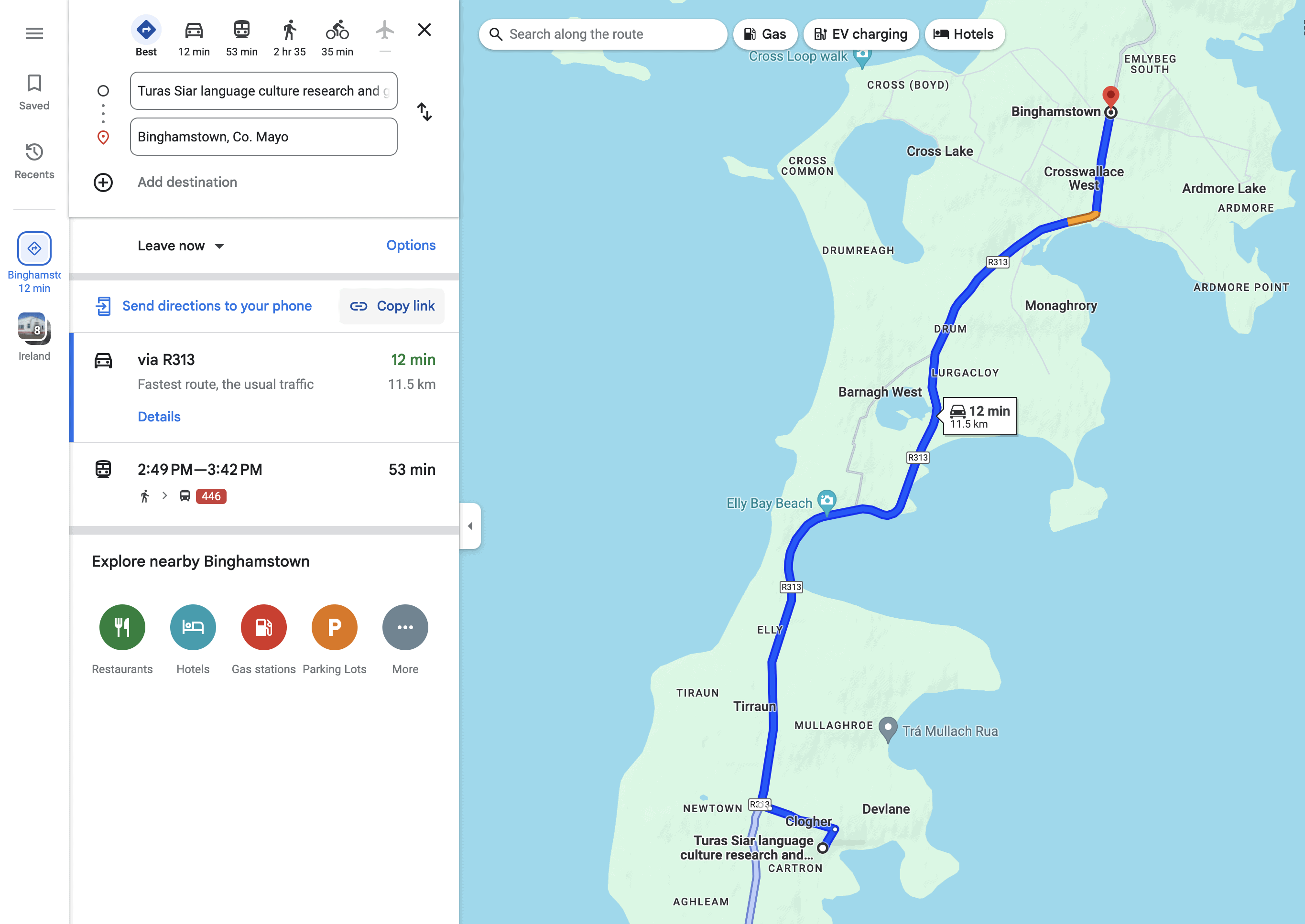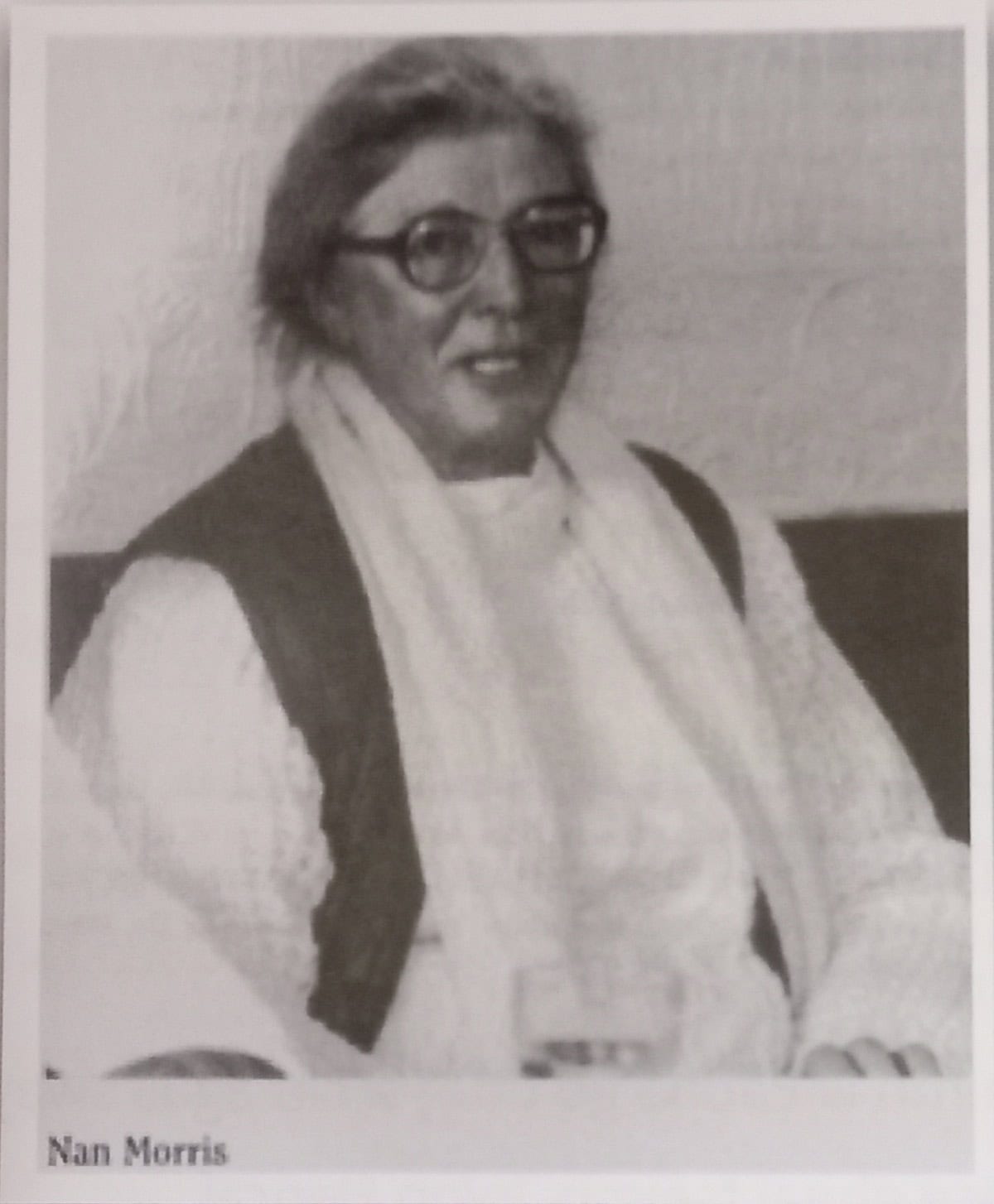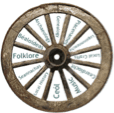Riocard Bairéad

This collection of songs and poets from the parish of Kilmore we hope will bring to mind the forgotten songs and poets both in Irish and in English.
All the poets in this collection are now gone to their eternal
reward and sadly have been forgotten and their songs have also been mostly forgotten.
The songs and poetry of Dick Barrett are still known far and wide.
I suppose the most common ones are still taught to children at National School level.
There has been a great many poets in this parish since Dick Barrett
passed on in 1819 and those are the ones we are focusing on in this collection.
Some composed works have many verses and some others may have only composed pieces of poetry or songs with just a few verses, nevertheless they are all equally important because in what they composed gives us a great insight to the way of life during their lifetime.
Back in those days hardly anything was ever written down and the songs spread throughout the area by word and mouth by traveling bards and poets who traveled the roads at the time.
It was also customary for someone to add a few verses of their own to what they had heard or picked up on their travels.
This you will find in many of the older songs where a verse or part of a verse from one song is used in another and this is more common in the old Irish songs of the time.
A stone to Riocard Bairéad can be seen in Binghamstown

Riocard Bairéad
Rugadh Riocard Bairéad air Bhaile na Bairaice timpeall na bliana 1740 agus mhair sé go dtí 1819.
Deir na sean-daoinaí gur thoir air bhruach an chladaí a tóigadh é agus gur cuireadh oideas roimhe, sin le rá gur cosúil go raibh teann air a gcúl ag a mhúinteir.
Bhí na Bairéadaí teann ina mbuille sa gceanntar seo ón deichú aois agus bhí go leor acu fud lorras agus seilimh acu air an gcuid ab fhearr den talamh.
Bhí an chuid ba chúachtaí dhíobh uilig ina gcónaí anseo í bPráiste na Cille Móire agus caisleáin dhá leir.
Bhí an caisleán ba bréachta dhá raibh ann í dTrán, in áit a dtugtar Biolla na Cloiche air.
Níor ionadh ar bith mar sin go bfhuair Riocard léann maith ina óige agus deir siad go raibh ceire teangachaí air a thoil aige.
Máisteir scoille a bhí ann agus chaith sé cuid mhór den am ag múnadh clann na n-uaisle ach tá sé ráití nach raibh scriobh na gaeilge aige nó go raibh sé
mean-aosta.
Níor tugadh riamh air ach ‘Dic’ thimpeall a áite fhéin.
Go léar an tseannachais bhí dúil sa mbraoin aige agus suim iomairt na gcártaí í dtighe an mhean-oíche.
Bhíodh Dic imithe leis ag cuartéacht air fud na mbailltí nuair a thigeadh an oíche, bhíodh damhsa sna tithí fadó agus sin mar a chastaí na fir agus na mná air a chéilí agus timpeall 1780 a casadh Nancy Tollett air, ba é a h-athair Jack Tollett an tiarna tallaí cheanntar Mhuigh Rathainn.
Ní raibh muinteir Nancy sastai go bhár gur caitliceach a bhí sa mBairéadach. D’fhág siad teach damhsa deireadh oíche agus phós siad faoi thóin.
Chuaigh Dic agus a bhean a chónaí air an gCáran ach cailleadh Nancy bhocht idir sin agus 1790.
Deir siad nach raibh aon mhuirín orthú, ach bhí sé ráití go raibh iníon aige roimag sin le bean eile go mhúinteir Mhórain.
Scatheamh í ndiaidh Nancy bás a fháil phós Dic bean de na Bairéadaí agus bhí beirt chlainne acu, Riocard óg agus Máire ach níor tharraing Dic ná a bhean ró-mhaith le chéilí riamh.
Go léar seannachais deir siad gur fear íseal le gruaig chatach fionn-bhán a bhí
ann.
Casadh fear le Dic lá agus d’fhiarraidh sé dhó cé raibh a léithide seo de fhear ina chónaí agus sé an freagradh a thug Dic air ná ‘leann ort siar nó go bhfeicfidh
Bhiodh scéaltaí ag an t’sean dream fadó agus seo ceannachu.
tú teach le clúdach air thaoibh amháin’.
Maith go leor mar sin a deir an strainséarí agus shiúl sé leis.
taobh thair agus ní fhaca mé teach a’bith nach raibh clúdach ar an dá thaobh. An lá ina dhiaidh sin casadh Dic dhó aríst agus ar seisean ‘Shiúl mé chuile bhaile Sea arsa Dic, ar nóidh tá fhios ag a chuile dhuine go bhfuil siad uilig clúdaigh a
an taobh amuigh!
Nuair a bhí sé ina óige bhí suil aige air iníon Heanraí Gamil ach ní raibh suim a’bith aici ann agus chum sé amhrán ag moladh a deirafúr nach raibh leath
chomh breá lei.
San amhrán ‘Róise Gheal Séibh’ thug sé árd mholadh dhith faoinna cuid
bréachta.
bhár
na
Seobh tafad breá ó Gráinne Mulqueen, a fuaras ó Nan Morris Béal Easa. Maidir le amhráin agus dánta Dic Bairéad, tá eólas maith orthú go scoileanna, dá bhrí sin ní fiú morán eile a rá faoi ach amháin a thabhairt chun cuimhne duit gur chuir an Dr. Nicholas Williams leabhar breá amach tamall bliantaí ó shin le dántaí agus amhráin, bfhiú go mór dhuil ar thóir an ábhair seo. Bhí sé an-gníomhach leis hÉireannaí Aontaithe agus chaith sé trí mhí í bpríosún Chaisleán a’ Bharra nuair rinneadh spíodóireacht air fhéin agus baoin eile de mhúinteir na h-áite a bhí ag réiteach leis na Francaí a thabhairt isteach anseobh air chladaí uaigneach an Mhuirthead.
Tá Dic Bairéad curthaí í reilic Mhainisteir na Croise.
Tá cuid go bhallaí mhanghrach an t-sean tígh ina seasamh go fóil ar an gCárin.
Richard Barrett
Richard Barrett was born near Barrack Point around the year 1740 and it would appear his parents were fairly well to do because he became a school master and spent most of his time teaching and educating the children of the gentry and the well off.
He was better known locally as Dick.
It is said of him that he could speak four languages: English, Irish, Latin and Greek but couldn’t read or write Irish until he was middle age.
History has it that he was a low sized man with fair curly hair.
The Barrett’s of Erris were quite well off and some of them held very large areas of land.
They first came to prominence around the 10th century when they overthrew the O’Donnells.
They had a few castles on the Mullet Peninsula (Parish of Kilmore Erris) and the biggest and finest of those was Barrett’s Castle in Tirane. This castle was in its glory from the 12th century onwards and all that’s left today is a big sandune covered over with grass and the stones of the castle lie underneath. Actually this is believed to be the landmark the Spanish Armada were looking out for when they sailed from the north Mayo coast under cover of darkness navigating between the islands and the western shore of the Mullet in an effort to come into Blacksod Bay avoiding detection of the British Naval Fleet.
Dick was fond of the good life according to the old history that has been passed on down through the ages and frequented many sheebeens and late night playing card houses.
It was also said he had a daughter out of wedlock with a woman of the Moran clan. He was also involved with one of Henry Gamble’s daughters, a landlord from Surgeview, but she didn’t want anything to do with him so he decided to compose a song praising her sister Roise who was far less attractive than her. The song is included in this collection and is performed on the CD by Nan Morris, Foxford.
This song was rarely heard here in Dick’s own parish unlike some of his more familiar songs which were taught to the children in local schools and are sung far
and wide today.
Sometime around 1780 he met and became friendly with Nancy Tollett, daughter of another landlord, Jack Tollett of Morahan. After a short while they wanted to get married but her family refused because Dick was a catholic and she was a protestant but one night they eloped from a local house dance and married somewhere discreetly.
By now Dick was living in Carne and he and his wife lived there for a few years. They had no family and before 1790 she had passed away.
A few years later he married a Mary Barrett and they went on to have two children, Mary and Richard but they didn’t seem to get on very well and the marriage was not a happy one.
Dick was actively involved in the United Irishmen and was to the fore when plans were being made to land the French somewhere on the shores of the Mullet Peninsula. However, the plan had to be abandoned because some member of a well-known local clan found out about it and reported it to the authorities at the time and the French general had to be taken out to sea and put on board ship south of Devlaune Mór island. Eventually the plan was moved further north and General Humbert landed in Killala.
According to local history Dick was arrested and spent three months in Castlebar prison.
He died December 1819 and is buried in Cross old cemetery. A strong wooden cross was erected in his memory by Father O’Reilly, and bore the inscription:
Western People 1889 current Saturday, August 13, 1927
RIOCARD BAIRAD,
l’de lorrins,
Fuair bas an bed la de mi na Nollag. 1819

On Saturday June 18th 1983 amount was erected in his memory in the old
Dr Nicholas Williams produced a very worthwhile book on his poems and songs [ Amhrain Riocanrd Bairead] which is really worth having in any collection.
The poem engraved on his tombstone at Cross Point
Why spend your leisure bereft of pleasure Amassing treasure?
Why scrape and save?
Why look so canny at every penny?
You’ take no money into the grave
Mongrach shean-teach Dic Bairéad ar an gCarin fado Pictures of remains of Dick Barrett’s house long ago in Carne taken by Gerry Keane, Cross with kind permission from Fr. Kevin Hegarty
Nóirin Geal Séimh Iníon Anraoi – By Riocard Bairéad
1
Tá duibheagán ins an spear ins ar ngealaigh is ins an ngréin
Agus ins an fharraige uilig go leir I mo thimpeall
Nil seamar ar bith feir ag fas anios as cré
Is tá imeacht an t-saoil athraithe
Ta eanlaithe an aeir uilig ag dul san eagar
Gan focal ina mbeal ach mangar
Is ó chruthaigh Adhamh is Eabha is gurb
Aici bhi an cliú an chéim
Nóirín Gheal t-séimh iníon Anraoi
2
Guím féin on gcroí ar maidin chiúin is gach oiche,
An t-athair agus Rí na nGrásta
Screadamuid ar an lao a ceannaigh sinn go daor
Is d’fhulaing dhúinn ar chrann na Páise
Muire Mhór ‘s Brid ‘s gach aspal is naomh,
Dhá bfhuair seilbh ins an riocht neamhaí,
Le cruinneacht ban an tsaoil a ligeann chugainn ina suí,
Is biseach a thabhairt díthe ina slainte
3
Thug mé gra dhá béal ba bhinne é na guth téad
Do ghuigh mé Muire is í I bpéin an uair sin,
An darna grá dhá taoibh ba gile é ná clúmhach ean,
Is gach a bhfaca me den aol buailte
sAn triú grá a thug mé níl ó Fhlaitheas Dé,
obs Ni ar bith a scaoilfeadh, dar liomsa,
Mara bhfaghainn fáill oíche no lae cead síneadh léithe,
Nóirín gheal tseimh iníon Anraoi.
4
I leaba imirt is ól agus alteas is sport
Nil againn ann ach brón is éagaoint,
Fanfaidh muid go fóill faoi thuirse is ag dhéanamh bróin,
A chuisle is a stóir nó go n-eirí.
Tá na boicht ag dul ar ród gan misneach ‘s ag dhéanamh bróin Ag sileadh na ndior is ag géarghal
Note.
A bhruil d’airgead ‘s d’or is d’ionnus ar an domhan mhór,
A chuirfeas biseach, a thabhairt do Nóirin
There are at least three written versions of this song, ‘Roise Ní Cheamaill’, Nóra Gheal t-Séimh Iníon in Amhrán Ghaeilge an larthar’ by Micheal O Tiomanaí 1906 and ‘Roise Gheal t-Séimh Inghean h-Anraoi in Amhrain O lorras’ le Micheal O Gallachobhair.
All three contain the same verse but O Tiomanai’s version differs in theme somewhat. ‘Róise Ni Cheamaill’ is attributed to the Erris poet Riocard Bairéad, a song lamenting about a very beautiful girl who was ill. According to O Gallachoir she was Nóirin, the daughter of Anraoi O Cathmhaoil of Blacksod, Erris, but he casts doubt on the authorship of De Bairead.
This is Nan Morris from foxford who preformes a song on our CD of Riocard Bairéad.

